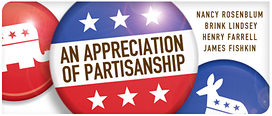Lead Essay
Lead essayist Nancy Rosenblum argues that political parties need a “moment of appreciation.” Schemes to minimize, frustrate, or avoid party politics, and replace it with bipartisanship or nonpartisanship all seem founded, to her, on misconceptions that date to the Progressive Era. Among these misconceptions are the ideas that nonpartisan decisionmakers are impartial, well-informed, and above the corrupting influence of politics. Parties, meanwhile, serve many useful functions in politics. They reduce transaction costs to new political entrants (at whatever level). They encourage the formation of political communities, and they act to inform and supply coherent narratives about current events. Further, the need to maintain winning coalitions means that political parties actually foster, rather than impede, political compromises.
Response Essays
In his response essay, Brink Lindsey reminds us of the shortcomings of American partisanship. Although parties provide information to voters, they do so in an skewed and superficial way. They exact ideological commitments that are hard to justify on their merits, and they constantly present a temptation to groupthink. American parties have changed, however, and for the better: Formerly, they were almost exclusively based on personal loyalty and patronage. Our parties have become ideological, but only imperfectly so, and they still do not present a deliberative space that conduces to rational, impartial citizenship.
In his response, Henry Farrell brings up the distinction between partisanship and extremism. He notes that although political parties clearly have useful coordinating and compromise-facilitating features, some issues may well not be appropriate matters for compromise. The problem, then — if there is one — would not be that so-called extremists are too partisan. It would be that they are unwilling to compromise. And perhaps on certain issues, they should be. Bloggers and the Democratic netroots movement are cited as illustrative examples, as is the refusal of many in the Democratic Party to compromise on the question of torture.
James Fishkin offers several models of what democracy is supposed to do. He weighs each in turn and proposes that deliberative democracy — defined as a process that “contain[s] some claim to representativeness with good conditions for deliberation” — is the one most worth having. Partisanship squares badly with it. What we need, he argues, is not more independents among the general voting population, but more independence among partisan voters.
The Conversation
Related at Cato
» Policy Analysis “A Critique of the National Popular Vote” by John Samples
» Policy Analysis “The Myth of the Rational Voter” by Bryan Caplan
» Policy Analysis “The Libertarian Vote” by David Boaz and David Kirby

